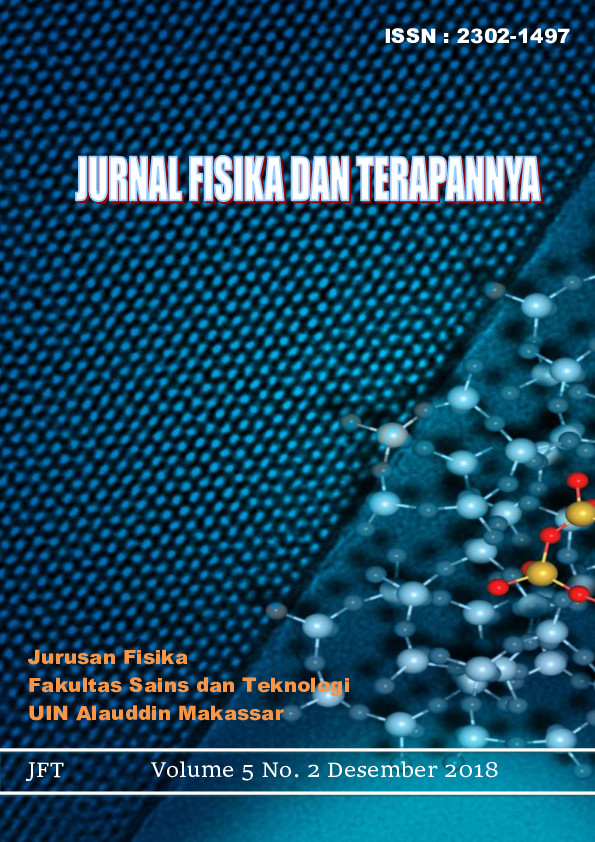PEMANFAATAN LIMBAH CANGKANG KEONG SAWAH (Bellamya javanica) UNTUK SINTESIS HIDROKSIAPATIT DENGAN MODIFIKASI PORI MENGGUNAKAN PATI UBI JALAR
Abstract
The research has been carried out by utilizing pore conch shell waste using sweet potato starch to make porous Hydroxyapatite using porogen sweet potato starch by precipitation method and to determine the bioactive properties of apatite hydroxy and the growth of apatite crystals using Simulated Body Fluid (SBF). This study used wet precipitation method. The results of the analysis using XRD show that the HAp phase has been formed. The morphology of HAp based on SEM results shows that HAp pores modification is produced in the composition of HAp added with 20% sweet potato starch with 6 hour sonication wich results in pore size from the range 0,23-3,37 µm. This result is not correlate with the theory that the best pore modification is produced in the composition of HAp added with 30% starch. This is because there are difference characters of each sweet potato used. The result of in vitro tests on synthesis HAp samples and 7 days porous HAp have shown the growth of apatite crystals in SBF solution media (Simulated Body Fluid).Downloads
References
Athawi, Aldhi. Sintesis Hidroksiapatit Berpori Dari Cangkang Keong Sawah (Bellamya Javanica) Dengan Penambahan Pati Singkong Sebagai Porogen. Bogor: IPB. 2013.
Baby RL, Hasan I, Kabir KA, Naser MN. Nutrient analysis of some Commercially important molluscs of Bangladesh. J Sci Res. 2(2): 390-396. 2010.
Dahlan, Kiagus. Potensi Kerang Rangan Sebagai Sumber Kalsium dalam Sintesis Biomaterial Subtitusi Tulang “Jurnal”, FMIPA Universitas Lampung. 2013.
Febriansyah, Mugananda. Sintesis Dan Uji In Vitro Hidroksiapatit Dari Limbah Cangkang Keong Sawah (Belamya Javanica) Berporogen Pati Kentang. Bogor: Institut Pertanian Bogor. 2013.
Fitri, Desy Kusuma. Sintesis Hidroksiaptit Dari Cangkang Keong Sawah (Belamya Javanica) Dengan Metode Basah Dan Modifikasi Pori Dengan Kitosan. Bogor: Institut Pertanian Bogor. 2014.
Kim HS, Kim JT, Jung YJ. Preparation of Porous chitosan/fibroin Hydroxiapatite Composite Matrix for Tissue Engineering. Macromolecular Research. 15(1):65-73. 2007.
Pane MS. Penggunaan Hidroksiapatit Sebagai Bahan Dental Implan (Skripsi). Medan: Universitas Sumatera Utara. 2004.
Riyanto, Agung Ardy. Pemanfaatan Limbah Cangkang Keong Sawah (Bellamya Javanica) Untuk Sintesis Hidroksiapatit Dengan Modifikasi Pori Menggunakan Pati Beras Ketan. Institut Pertanian Bogor: Bogor. 2013.
Santos MH, de oliveira M. Souzal PF, Mansur HS, Vasconcelos WL. Synthesis Control and Characterization of Hydroxyapatite Prepared by Wet Precipitation Process. Mater Res 7(4): 625-630. 2004.
Soido C, Vasconcellos MC, Diniz AG, Pinheiro J. An Improvement of Calcium Determination Technique in the shell of Molluscs. Brazilian Archives Of Biology And Technology 52(1): 93-98. 2009.
Sopyan I, Mel M, Ramesh S, Khalid KA. Porous hydroxyapatite for artificial bone applications. Science and Technology of Advanced Materials 8:116–123. 2007.
Utami, S. Pembuatan komposit Kalsium Fosfat Kitosan Dengan Metode Sonikasi. Institut Pertanian Bogor: Bogor. 2009.


